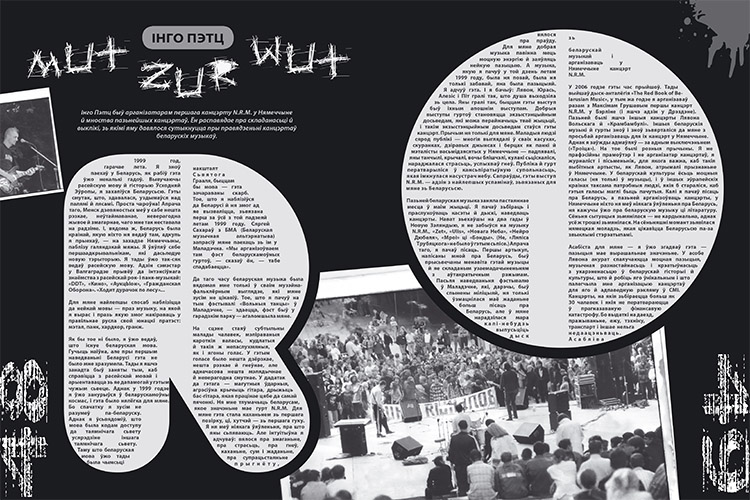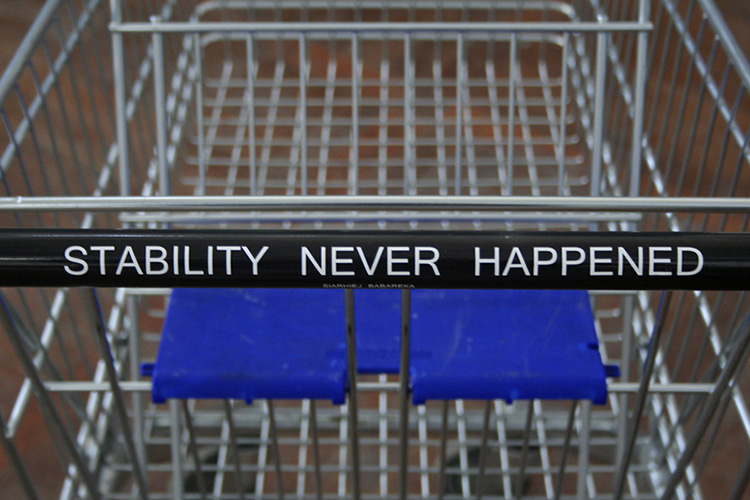
Аўтар: pARTisan, 06/06/2015 | Cult Aktivist event MUSIC
MENTAL FORCE: FOR THE SAKE OF MUSICAL-VISUAL EXPERIENCE
On May 22-23 2015 in Minsk space «Studio67», the electronic music & live video performances festival Mental Force — the first in the series of upcoming events — took place featuring such world-renowned audiovisual artists as Robert Henke’s solo project Monolake (Germany) and Tarik Barri (Netherlands/Germany).
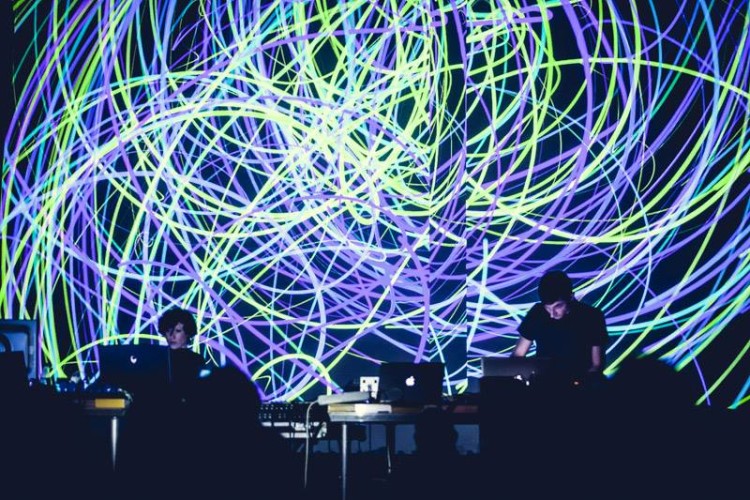
Mental Force. Photo: Goethe-Institut / А. Tarantino Ždanovič
These artists agreed to perform together at the request of the organizers Viktar Kamianiecki, Julia Kaviazina, Pavel Niakhayeu and Volha Salakheyeva who represent the Belarusian labels Foundamental Network and Force Carriers. By the way, this fact gives the festival its name, which refers to the labels themselves and precisely defines the concept of the event. Apart from the guest headliners, music and video artists from Belarus also took part in the festival, among whom i/dex, Alexei De Bronhe & Artemiy Kalinin, Pavel Ambiont & Solar Olga, ism, Khmarun & TXYZ, Apex Sphere, Poltishiny and Andrei Savitsky. Educational program was held the next day: Robert Henke’s and Tarik Barri’s lectures.
The project was supported by Goethe-Institut Minsk, as well as by other partners, but what regards the organization of the festival itself — its concept, planning, management and promo actions — it was a group of four people who were in charge of all. «We have discussed everything together, but each of us has a „super-power“ of his/her own, — Pavel Niakhayeu explains. — Julia is an excellent project manager, she is able to find the necessary contacts and equipment very fast, she is also good at planning the budget. Viktar is a professional designer, besides they were both engaged in web-site construction, Volha is a guru of media planning and PR, whereas I write all sorts of concepts, articles and translations». The idea of the festival did not come out of the blue. The group had already had experience in the organization of cultural events of various formats — musical, artistic, educational, and this is what they will continue to deal with in future.
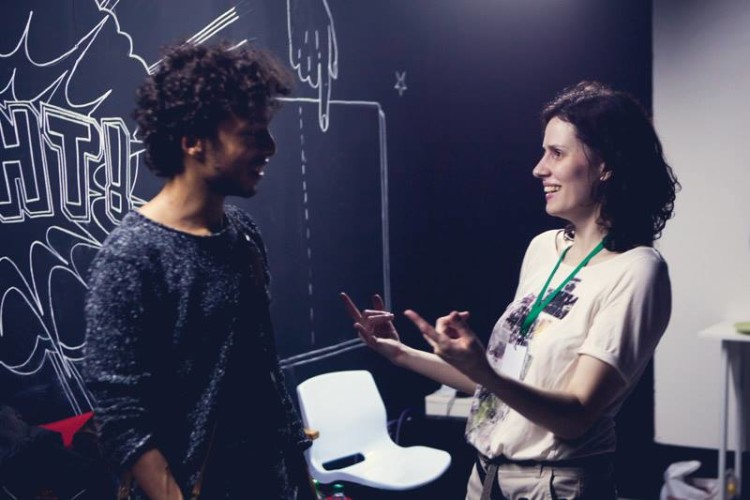
Tarik Barri and Julia Kaviazina. Photo: Goethe-Institut / А. Tarantino Ždanovič
— How did you come up with the idea of the festival? Was it a spontaneous thought or it had been prepared strategically, since one can feel that the event is really significant?
Pavel Niakhayeu: In 2008 Viktar Kamianiecki and Julia Kaviazina held peformances with European top electronic musicians (Vladislav Delay, Pole, Mikkel Metal), and in 2009 together with its main organizers they worked at the festival In-Touch creating an excellent experimental program (Signal, Zavoloka, Mika Vainio). Since the end of 2010 the four of us jointed our efforts in developing the festival Live Performers Meeting — Minsk. It was set by the Italian team in cooperation with us and «Ў» Gallery of Contemporary Art. In the course of 10 months of work we received good training, we learned a lot and realized that together we could do a lot of interesting things. The festival was wonderful and gathered about 120 artists from nearly 20 countries — VJs, video artists, live coders, visual theaters and performers, musicians, researchers and others interested in the field of digital art and technology.
Since then we realized that music alone was not enough — it was necessary to address visual and performative components too, as well as education in this area, since nowadays any branch of contemporary art and popular culture use the benefits of digital media technologies with the latter not so immediately integrating these practices and techniques.
And in Belarus, unfortunately, after a couple of years of enthusiasm young artists — musicians and VJ/video artists — often get disappointed and turn to routine work and daily life. So it is an absolute necessity for creative environment to keep on pulsating being a field where they could create, display their work, obtain additional knowledge and experience, get inspired by collaboration with others — in short, this movement should never stop. And this can happen only through the cooperation of various communities over the years.
This story can be given as a preface. As for «Mental Force» festival, the events unfloded in the following way. On November 20, 2014 Volha, Julia and I were in Berlin at Monolake & Tarik Barri performance — the concert really impressed us. We used to play with Robert Henke at a couple of festivals — so, the minimal contact and the common context were present. After the show we had a short talk with them, joking that we would like to invite them to Minsk. The joke did not scare them at all. On December, 5 the four of us got together and discussed our plans for the next year: the events, the lists of artists — and began to think about a possible institution that could support the project and help with guest artists. Among the planned events there was also a spring audio-visual festival with Monolake. It was a minimum program, but there was also a maximum one. Thus, on December, 15 we sent the concept of the event to Goethe-Institut, informing them who we would like to invite and what kind of assistance was necessary. Pretty soon we received their preliminary consent. On January, 15 we contacted Robert and Tarik and learned about the conditions of the performance and the available dates. They had been cooperating for long, but Robert usually performs pieces from his new album without any visual support and not in the format A/V festivals. What we have seen and heard in Berlin was an exception. And he agreed to make another exception for Minsk.
So, in early February we got the consent both from the artists and from Goethe-Institut, which agreed to take a full responsibility for Robert and Tarik’s visit. Whereas we delt with the preparation of the whole event — looking for the venue, equipment and partners, the selection of the Belarusian performers, touring certificate, media plan, writing articles, design, site, printing, making money to cover it all and a lot of other technical and organizational issues.
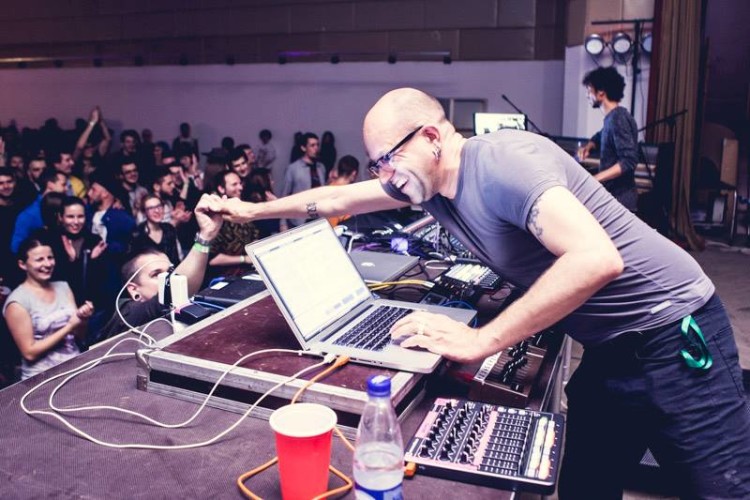
Monolake & Tarik Barri. Photo: Goethe-Institut / А. Tarantino Ždanovič
— What difficulties or specific features does our context have in the organization of such events?
Pavel Niakhayeu: Financial and institutional support is extremely important for such festivals which is impossible to be found in our country. Otherwise, it would have been necessary to commercialize everything in quite a different way — and set pop festivals with extremely expensive tickets. Without Goethe-Institut, we would have been able to invite neither Robert Henke, nor Tarik Barri — with rather democratic prices for entrance tickets. As you know, the Institute supports the visits of prominent German artists and experts, and these artists are really such, they are professionals of the highest level. Together with his colleague Gerhard Behles, Robert literally made a breakthrough in electronic music: he developed a program «Ableton Live» and is now working at laser shows, which nobody in the world has ever set. Of course, to bring these artists to a place they have never been to is not easy. Goethe-Institut has quite a reputation, which is very important when an artist is planning a visit to a completely new country. If we invited artists from other countries, we would address other institutions.
The possibility to be completely self-financed or to have a tangible support from local sponsors is out of question.
— To what extent are such kind of music and events demanded in Belarus?
Pavel Niakhayeu: It is not only about electronic music. Well, it can also be quite different with each segment having its own target audience. Electronic music encompasses pop DJs at Minsk Arena, discos at «DOZARI» club, undeground parties, forest open airs and very experimental micro-festivals. We do not want to set entertainment commercial events which are financed by means of alcohol, tobacco, drugs, sex-tourists or people who do not care who is on stage — let it be just cool, exciting and popular. Neither do we want to organize classic raves. There are people who do this job at a very high level and we get all the pleasure to attend at these events ourselves. As for us, we have our own landmarks in the world of experimental musical and multimedia art festival and this is the format which really lacks in Belarus. Taking into account that we do have experience and, as Julija has already said, good Belarusian artists who perform at similar festival abroad.
Belarus, Minsk included, needs its own «Transmediale», «CTM», «Unsound», «LPM» or «Up To Date», and it must be not a one-time-held project, there have already been several of this kind, but a regular series.
— What are Robert’s and Tarik’s impressions of the festival and in general of Minsk?
Volha Salakheyeva: You should address this question to them, certianly, but we really had some time in breaks to discuss this or that with Robert and Tarik. For example, they were impressed by Poltishiny’s first project, namely the opportunity to listen to a very high quality improvisation of two composers, moreover performed in the darkness. They were surprised that the youth did not know what to do when techno music was performed — whether to stand, to lie down, to kick, to dance or to shake. Although, as it seemed to me personally, during their performance the audience started vibrating actively and even 30 minutes after the performance it did not let them go.
We managed to show them around the city only on the arrival day: we walked from the «Pieramoha» Cinema down to Niamiha, passing by the Trinity Suburb, the Opera and Ballet Theatre, then across the dark park by the monument to Marat Kaziej. We scared a few kissing couples with our lively discussions of ideas for electronic projects, as, for example, the One Pixel Festival. Then we went to the river bank and stopped to look at the radio tower. This is how one of the Minsk sights appeared to be captured with Robert’s phone. «Lenin’s House» caused a couple of funny jokes and then we moved to the main monument of our city with the official culture evolving on the surface and the alternative one — underground.
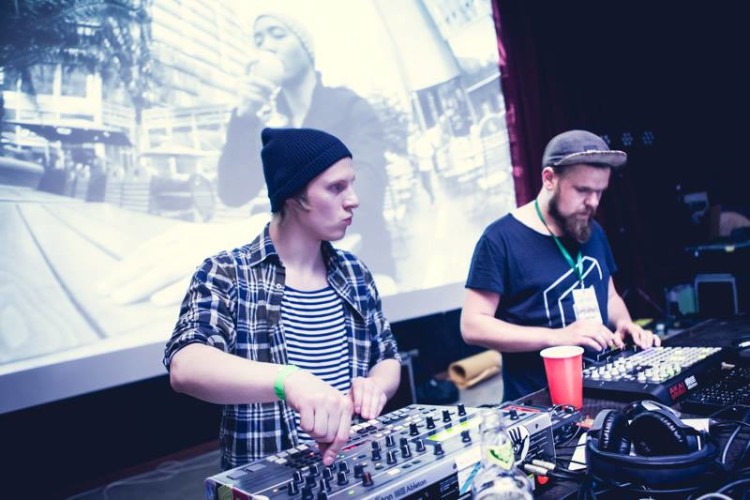
Alexei De Bronhe & Artemiy Kalinin. Photo: Goethe-Institut / А. Tarantino Ždanovič
— How did the Belarusian artists feel against the background of the guest celebrities? May be, some words about Belarusian participants.
Pavel Niakhayeu: It was not a festival with headliners and a set of music extras — at least for us. We are very cunning and with one festival we reached several goals: to bring Robert and Tarik, to show that we have the artists who are not worse than they, to give an incentive to do something more powerful than usual — both for musicians and video artists. In addition, we wanted to attract a new audience, to motivate to study independently some new creative techniques people who would probably grow into become artists themselves. Robert and Tarik are incredible since one can not only listen to them and watch their performance, but also to learn from them. On the second day of the festival, they talked about their work and their creative methods.
And I would not be mistaken if I say that in Minsk there have never been media artists of such a level who would share their knowledge and inspiration. And people who came to the lecture were eager to ask them questions all day long.
A year ago we were dreaming of Robert Henke’s performance in Minsk. We saw them as ideal candidates for the first Mental Force. But that was not enough. We wanted to use the natural attention given to such outstanding artists to attract people to the festival and to show once again that our artists are worthy of their attention, too, that we have someone to be proud of. (The brains are the same, only working and living conditions are different, which complicates the creative process.) We wanted our foreign guests to see this because rumors in music industry travel fast and such festivals form the image of our scene abroad, they create conditions for foreigners showing that they should not be afraid of visiting Belarus and promoters from different countries have no grounds to fear to cooperate with our artists and counterparts.
Julia Kaviazina: Many people said that we put together the incompatible — improvisation, ambient, techno and drone — all in one festival. But our goal was to show the «mental force», our creative idea, which is transformed into a completed project. I think we reached it, we invited to perform those artists who create history just in front of us. For example, Ales Tsurko & Kanstantsin Yaskou (Poltishiny project) opened the festival and improvised with the Belarusian lullaby The Cat Went into the Woods. Both the musicians initiated the creation of the Society of New Music Development, which aims at promoting contemporary classical music. Kanstantsin is a well-known composer and teacher, the author of orchestral, chamber and vocal works. Ales explores new forms of composing music and in the course of his performance he used a program that had made himself. Soon it will be released as an iOS application and will be available to any musician.
Alexei De Bronhe & Artemiy Kalinin created a live-cinema project Laserlove Townsheeps and filmed the material for it in Berlin for only 25 days. Live-cinema is a new kind of media performance that connects music and footage assembling: every time in front of the audience the film gets re-assembled. Those who have seen their project will be unlikely to forget it. Maybe dancing while watching a movie is hard, but here is a photo report: the performance really put the dance floor on fire!
Another participant is Vitali Harmash, one of the leading sound designers in Belarus, who for more than 20 years has been composing high-tech IDM, Glitch and Ambient music. He has released a big number of solo albums and a joint records with renowned music producers and dozens of performances at European festivals. Vitali toured with crazy Polish «chemists» — visual performers Analog Visuals, he wrote music for the German silent thriller of the 1920s Golem and for the play Silk by Alessandro Barrico. At the festival Mental Force he presented a video set, which he had programmed himself, but Volha Salakheyeva helped him because a couple of days before the show Harmash had injured his hand. You can read about every participant at the festival website www.mentalforce.by — all the projects are interesting and unusual in their way.
— Were you satisfied with the results and the public?
Pavel Niakhayeu: In my opinion, the festival was a success. But one festival is not the result at all, but only the beginning. As I said, there are a lot of ideas — I wish we had money for their realization.
One of our goals is to join the network of festivals European/International Cities of Advanced Sound. It is not an affair of one year, but it is well worth the effort. After all, this is also the status of Belarus as a creative place to visit not for the sake of Stalin’s empire and exotic soviet stuff, and for bright musical-visual experience. Moreover, this is an opportunity to do joint projects with other festival participants, to seek for advice and support, to do more complex conceptual project — commissioned works — co-produced by Belarusian and foreign artists and made especially for the festival.
Our main goals are further integration of Belarus into the European and global cultural space through creative communication and common language of music and media arts, as well as promotion of our scene’s development — and not only electronic-music or VJs. We want cooperation with other creative communities — programmers, theater-goers and performers, sculptors, poets and scientists — everyone united by the power of the creative mind, and the absence of indifference to life.
From a visitor’s review:
«Foundamental Network in Belarus is probably the only promotional group, which is engaged in non-commercial electronic music not at the local level, but rather seriously, and therefore the requirements and expectations from them are higher than from some party at „DK“ or at the „Hooligan“ terrace. It is good that they continue to meet the expectations and raise their own qualifications and the level of the events. It is cool that they invested efforts to find the venue that was perfect for the event of this kind. Another obvious plus was the lecture day that followed the events. Belarus dramatically lacks educational programs and it is good that the organizers understand this and think about it. A strong emphasis on the visual component of the event and viewing it not just as an accompaniment of music presents a big step forward for the local scene in the direction of European festivals in related areas. And finally, the most serious plus of the organizers is their involvement into the overall global context, with this kind of the mindset they should succeed greatly».
Specially for pARTisan
Opinions of authors do not always reflect the views of pARTisan. If you note any errors, please contact us right away.




